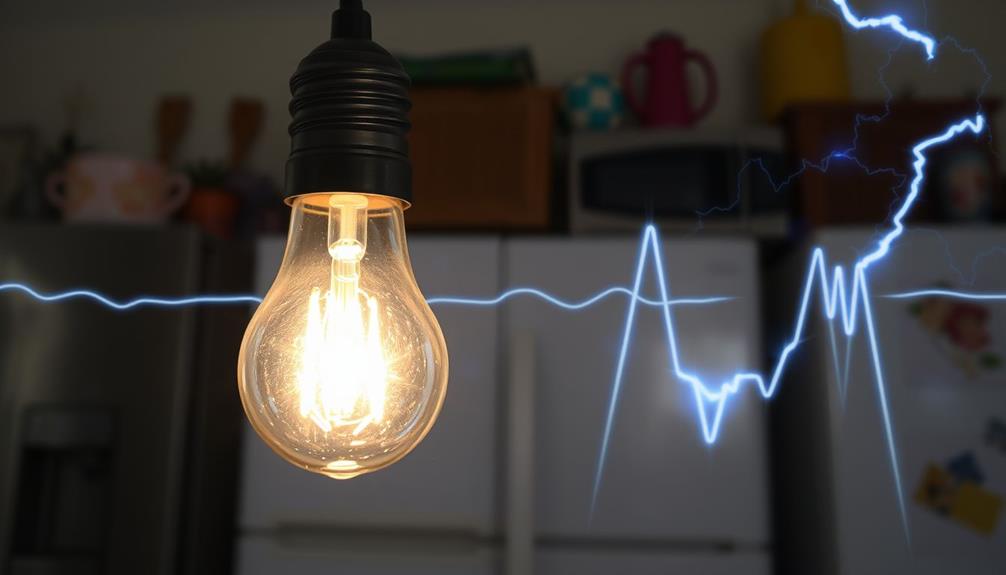Welcome to our guide on ’13 Tips: Energy-Efficient Appliances & Environmental Impact.’
In this comprehensive resource, we will explore the world of energy efficiency and its positive effects on the environment.
By adopting energy-efficient appliances, we can make a significant difference in conserving resources and reducing our carbon footprint.
Throughout this guide, we will delve into various topics, including understanding energy efficiency ratings, busting common myths, and maximizing energy efficiency in our daily appliance use.

We will also discuss the long-term impact of these appliances on our environment and the government incentives available to support this transition.
So, let’s dive in and discover how we can make a mastery-level impact on the environment through energy-efficient appliances.
Key Takeaways
- Energy-efficient appliances reduce energy consumption and lower utility bills, leading to significant cost savings for consumers.
- Energy-efficient appliances help decrease carbon emissions, conserve natural resources, and contribute to a greener and more sustainable future.
- Energy-efficient appliances have environmental benefits such as reducing greenhouse gas emissions, conserving water, and improving air quality.
- Investing in energy-efficient appliances not only saves money but also increases property value and contributes to overall energy savings and cost reduction.
Understanding Energy Efficiency Ratings
Understanding energy efficiency ratings is essential for making informed decisions when purchasing appliances. Energy efficiency standards are set by regulatory bodies to ensure that appliances meet certain criteria for energy consumption. These standards are based on rigorous energy consumption analysis, taking into account factors such as power usage, standby power consumption, and overall efficiency. By understanding these ratings, consumers can choose appliances that not only meet their needs but also minimize their environmental impact.
Energy efficiency ratings provide valuable information about how efficiently an appliance uses energy. This information is typically displayed as an Energy Efficiency Ratio (EER), Seasonal Energy Efficiency Ratio (SEER), or Energy Star rating. The higher the rating, the more energy-efficient the appliance is. This means that it will consume less energy while delivering the same or even better performance.

By considering energy efficiency ratings, consumers can’t only save money on their energy bills but also contribute to a greener and more sustainable future. Appliances with higher energy efficiency ratings not only reduce greenhouse gas emissions but also conserve natural resources. Additionally, they often come with advanced features that further enhance their energy-saving capabilities.
The Importance of Energy-Efficient Appliances
Energy-efficient appliances play a crucial role in reducing our environmental impact. By using less energy, these appliances help decrease carbon emissions and minimize the depletion of natural resources.
Additionally, energy-efficient appliances can lead to significant cost savings for consumers, as they consume less electricity and water, resulting in lower utility bills.
Environmental Benefits of Efficiency
The environmental benefits of efficiency are significant when it comes to the importance of using energy-efficient appliances. By reducing pollution and promoting sustainable living, energy-efficient appliances play a crucial role in minimizing the environmental impact.

| Environmental Benefits | Description |
|---|---|
| Reduced Energy Consumption | Energy-efficient appliances consume less energy, resulting in lower greenhouse gas emissions and reduced reliance on fossil fuels. |
| Water Conservation | Many energy-efficient appliances, such as washing machines and dishwashers, use less water, contributing to water conservation efforts. |
| Waste Reduction | Energy-efficient appliances are often built to last longer, reducing the amount of electronic waste generated. |
| Improved Air Quality | Energy-efficient appliances produce fewer air pollutants, contributing to improved indoor and outdoor air quality. |
Energy-efficient appliances not only save money on utility bills but also offer long-term environmental benefits. By choosing these appliances, individuals can contribute to a more sustainable future.
Cost Savings With Efficiency
When it comes to the importance of energy-efficient appliances, one key aspect to consider is the cost savings that can be achieved through efficiency. Investing in energy-efficient appliances can lead to significant financial benefits. Here are some ways in which energy-efficient appliances can help reduce electricity bills and save money:
- Lower energy consumption: Energy-efficient appliances consume less electricity, resulting in reduced energy bills.
- Energy-saving features: These appliances often come with features such as programmable timers and power-saving modes, further reducing energy usage.
- Rebates and incentives: Many governments and utility companies offer financial incentives to encourage the use of energy-efficient appliances, providing additional cost savings.
- Long-term savings: Although energy-efficient appliances may have a higher upfront cost, their lower energy consumption can result in significant long-term savings.
- Increased property value: Energy-efficient appliances can increase the value of a property, making it a worthwhile investment.
By choosing energy-efficient appliances, not only can you save money, but you can also contribute to a more sustainable future.
Transitioning into the next section, let’s now explore the environmental benefits of energy-efficient appliances.

Environmental Benefits of Energy-Efficient Appliances
By regularly using energy-efficient appliances, we can significantly reduce our environmental impact. Energy efficient technology plays a crucial role in sustainable living, as it helps conserve energy resources and reduces greenhouse gas emissions. Let’s take a closer look at the environmental benefits of energy-efficient appliances in the table below:
| Environmental Benefit | Description | Example |
|---|---|---|
| Energy Conservation | Energy-efficient appliances consume less power, leading to reduced energy consumption. | LED light bulbs use up to 75% less energy. |
| Reduced Emissions | By consuming less energy, energy-efficient appliances produce fewer greenhouse gas emissions. | ENERGY STAR certified refrigerators emit 15% less greenhouse gas. |
| Water Conservation | Some energy-efficient appliances, such as washing machines, use less water, conserving this vital resource. | ENERGY STAR washing machines can save up to 25 gallons of water per load. |
| Waste Reduction | Energy-efficient appliances often have longer lifespans, resulting in less electronic waste. | A high-efficiency furnace can last up to 20 years, reducing the need for frequent replacements. |
| Improved Air Quality | Energy-efficient appliances generate less pollution, leading to cleaner indoor and outdoor air. | ENERGY STAR air purifiers remove 99% of airborne pollutants. |
Reducing Greenhouse Gas Emissions With Energy-Efficient Appliances
When it comes to reducing greenhouse gas emissions, energy-efficient appliances play a crucial role. By improving the efficiency of appliances, we can minimize the amount of energy consumed, resulting in lower greenhouse gas emissions.
This not only benefits the environment but also contributes to cost savings for consumers. Making informed choices and opting for energy-efficient appliances can have a significant impact on reducing greenhouse gas emissions and mitigating climate change.
Environmental Benefits of Efficiency
We can significantly decrease greenhouse gas emissions by opting for energy-efficient appliances. By choosing appliances that are designed with energy efficiency in mind, we can make a significant impact on reducing our carbon footprint.

Here are some environmental benefits that come with using energy-efficient appliances:
- Energy efficient manufacturing: Energy-efficient appliances are manufactured using processes that require less energy and produce fewer greenhouse gas emissions. This helps to minimize the overall environmental impact of the manufacturing process.
- Renewable energy integration: Energy-efficient appliances can be easily integrated with renewable energy sources such as solar panels or wind turbines. This allows for a greater utilization of clean and sustainable energy, further reducing greenhouse gas emissions.
- Reduced energy consumption: Energy-efficient appliances consume less energy compared to their conventional counterparts. This translates to lower electricity usage, resulting in decreased reliance on fossil fuel-based power generation.
- Lower carbon dioxide emissions: The reduced energy consumption of energy-efficient appliances leads to lower carbon dioxide emissions. This greenhouse gas is a major contributor to climate change, so any reduction in its emissions is beneficial.
- Environmental preservation: By reducing greenhouse gas emissions, energy-efficient appliances help in preserving the environment by mitigating the harmful effects of climate change.
Energy Savings and Cost
To maximize energy savings and reduce greenhouse gas emissions, it is essential to understand the cost benefits of using energy-efficient appliances. By investing in appliances that consume less energy, we not only save money but also contribute to a more sustainable future. Understanding the payback period of energy-efficient appliances is crucial in making informed decisions. Conducting an energy audit can help determine which appliances consume the most energy and identify opportunities for improvement.
Below is a table that compares the energy consumption and estimated cost savings of two refrigerators: one with an Energy Star rating and one without. The data clearly demonstrates the significant energy and cost savings that can be achieved with energy-efficient appliances.
| Appliance | Energy Consumption (kWh/year) | Estimated Cost Savings per Year ($) |
|---|---|---|
| Energy Star | 350 | $50 |
| Non-Energy Star | 500 | – |
Importance of Consumer Choices
By considering the importance of consumer choices, we can further reduce greenhouse gas emissions with energy-efficient appliances. Consumer behavior plays a crucial role in shaping sustainable choices and reducing environmental impact. Here are some key ways in which consumer choices can make a difference:

- Opting for appliances with high energy efficiency ratings, such as ENERGY STAR certified products.
- Considering the lifecycle impact of appliances and choosing those that are made from sustainable materials and are easily recyclable.
- Investing in smart appliances that can optimize energy usage and reduce waste.
- Adopting energy-saving habits like using appliances during off-peak hours and properly maintaining them.
- Supporting companies that prioritize sustainability and promote environmentally friendly practices.
By making conscious decisions and selecting energy-efficient appliances, consumers contribute to the reduction of greenhouse gas emissions and the preservation of our planet.
This, in turn, leads us to the subsequent section about conserving natural resources through energy efficiency.
Conserving Natural Resources Through Energy Efficiency
Through the use of energy-efficient appliances, our household actively contributes to conserving natural resources. Understanding efficiency labels and promoting sustainable living are key factors in achieving this goal. Energy efficiency labels provide vital information about the appliance’s energy consumption and performance, allowing consumers to make informed choices. These labels typically include data such as energy consumption in kilowatt-hours, energy efficiency ratings, and estimated annual energy costs.
By selecting appliances with higher energy efficiency ratings, we can reduce our overall energy consumption and minimize the strain on natural resources. For instance, replacing an old refrigerator with a new, energy-efficient model can save up to hundreds of kilowatt-hours annually. This not only reduces our carbon footprint but also conserves the energy required to manufacture new appliances.

Promoting sustainable living goes beyond the use of energy-efficient appliances. It involves adopting practices like proper insulation, smart home technology, and mindful energy consumption. By implementing these strategies, we can further reduce our energy consumption and preserve natural resources for future generations. Additionally, investing in renewable energy sources such as solar panels can help decrease our reliance on fossil fuels and mitigate the environmental impact of our energy usage.
Energy-Efficient Appliances and Climate Change
In reducing our carbon footprint and combating climate change, we can achieve significant progress by investing in energy-efficient appliances. By understanding energy consumption and promoting renewable energy, we can make a positive impact on the environment. Here are some key points to consider:
- Energy-efficient appliances consume less electricity, reducing greenhouse gas emissions and mitigating climate change.
- These appliances are designed to maximize energy efficiency, resulting in lower energy bills and cost savings for consumers.
- Investing in energy-efficient appliances helps to reduce the demand for fossil fuels, which are major contributors to greenhouse gas emissions.
- By using energy-efficient appliances, we can contribute to the overall reduction in carbon dioxide emissions, a primary driver of global warming.
- Energy-efficient appliances also help to conserve natural resources, as they require less energy to operate and therefore reduce the need for resource extraction.
The Role of Energy Efficiency in Sustainable Living
To achieve sustainable living, we must prioritize energy efficiency and its vital role in reducing our carbon footprint. Understanding sustainable practices and promoting renewable energy sources are key components of this endeavor.
Energy efficiency involves using less energy to perform tasks and functions, thereby reducing the amount of energy consumed and minimizing environmental impact. By adopting energy-efficient practices and technologies, we can significantly decrease our energy consumption and greenhouse gas emissions.

Promoting renewable energy sources is another crucial aspect of sustainable living. Renewable energy, such as solar, wind, and hydroelectric power, is derived from sources that are naturally replenished and have minimal environmental impact. By transitioning from fossil fuels to renewable energy sources, we can reduce our dependence on finite resources and decrease our carbon emissions.
Incorporating energy-efficient appliances and technologies into our daily lives is a practical way to achieve sustainable living. Energy-efficient appliances, such as ENERGY STAR-rated products, are designed to use less energy while providing the same level of performance. These appliances not only help reduce our carbon footprint but also save us money on energy bills in the long run.
Energy Savings and Cost Reduction With Energy-Efficient Appliances
By incorporating energy-efficient appliances into our daily lives, we can experience significant energy savings and reduce our overall costs. Understanding energy consumption and utilizing energy-efficient appliance features can help us achieve these benefits. Here are some key points to consider:
- Energy consumption: Energy-efficient appliances are designed to use less energy without compromising their performance. By understanding our energy consumption patterns and choosing appliances with low energy requirements, we can lower our energy bills.
- Energy-saving features: Energy-efficient appliances often come with features such as programmable timers, temperature controls, and sensors that optimize energy usage. These features allow us to customize our appliance settings and reduce energy waste.
- Energy ratings: Look for appliances with high energy efficiency ratings, such as the Energy Star label. These ratings indicate that the appliance meets strict energy efficiency standards set by regulatory bodies, resulting in lower energy consumption.
- Cost savings: By reducing our energy consumption, we can save money on our utility bills. Energy-efficient appliances may have a higher upfront cost, but the long-term savings they offer outweigh the initial investment.
- Environmental impact: Energy-efficient appliances not only benefit our wallets but also contribute to a greener environment. By reducing energy consumption, we can lower greenhouse gas emissions and help combat climate change.
Understanding the impact of energy-efficient appliances on energy savings and cost reduction is essential for making informed choices. In the next section, we’ll explore how to choose the right energy-efficient appliances for our homes, ensuring maximum efficiency and savings.

Choosing the Right Energy-Efficient Appliances for Your Home
When choosing energy-efficient appliances for our homes, it’s important to consider the balance between cost and efficiency.
While appliances with higher energy efficiency ratings may initially cost more, they can lead to significant savings in the long run through reduced energy consumption.
Additionally, opting for energy-efficient appliances can have a positive environmental impact by reducing greenhouse gas emissions and conserving natural resources.
Cost Vs. Efficiency
As we consider the cost vs. efficiency of choosing energy-efficient appliances for our homes, it’s important to carefully evaluate the long-term savings they can provide. When it comes to making energy-efficient upgrades, here are some key factors to consider:

- Energy savings: Look for appliances with high Energy Star ratings, indicating that they consume less energy and reduce utility bills.
- Lifecycle costs: Consider the upfront cost of the appliance along with its operating costs over its lifespan to determine the true cost-effectiveness.
- Rebates and incentives: Research available rebates and incentives offered by utility companies or government programs to offset the initial cost of energy-efficient appliances.
- Maintenance and repairs: Energy-efficient appliances often require less maintenance and have longer lifespans, leading to cost savings in the long run.
- Resale value: Energy-efficient appliances can increase the value of your home and attract potential buyers in the future.
Environmental Benefits
To maximize the environmental benefits of energy-efficient appliances in our homes, we should prioritize choosing the right ones. Energy-efficient appliances play a crucial role in reducing the environmental impact of our homes. By consuming less energy, these appliances contribute to the overall goal of creating energy-efficient buildings. This is particularly important as buildings account for a significant portion of global energy consumption. By selecting appliances that are energy efficient, we can reduce our reliance on non-renewable energy sources and promote the use of renewable energy sources.
Additionally, energy-efficient appliances help to decrease greenhouse gas emissions, which are a major contributor to climate change. By making informed decisions when purchasing appliances, we can make a positive impact on the environment and contribute to a more sustainable future.
Transitioning into the subsequent section about ‘common myths and misconceptions about energy efficiency’, it’s important to address some of the misunderstandings that often surround this topic.
Common Myths and Misconceptions About Energy Efficiency
Despite the prevalence of common myths and misconceptions, we’ve found that energy efficiency isn’t as complicated or unattainable as many people believe. In fact, there are several misconceptions about energy efficiency that we’d like to address:

- Energy-efficient appliances are more expensive: While it’s true that energy-efficient appliances may have a higher upfront cost, they can save you money in the long run through reduced energy consumption.
- Energy-efficient appliances are less effective: This is a common misconception. Energy-efficient appliances are designed to perform their intended function while using less energy. They’re just as effective, if not more so, than their less efficient counterparts.
- Turning off appliances doesn’t save energy: Many people believe that leaving appliances on standby or in sleep mode doesn’t consume much energy. However, even in standby mode, appliances continue to draw power. Turning them off completely can save significant amounts of energy.
- Energy-saving tips are inconvenient: Some people think that energy-saving tips require major lifestyle changes or sacrifices. However, simple actions like using energy-saving light bulbs, adjusting thermostat settings, and unplugging electronics when not in use can make a big difference without inconveniencing you.
- Energy efficiency is only for environmental enthusiasts: Energy efficiency benefits everyone, not just environmental enthusiasts. It can save you money on energy bills, reduce your carbon footprint, and contribute to a more sustainable future.
By dispelling these common misconceptions, we hope to show that energy efficiency is within reach for everyone.
Now, let’s move on to the next section and explore some tips for maximizing energy efficiency in daily appliance use.
Tips for Maximizing Energy Efficiency in Daily Appliance Use
Now, let’s explore some practical tips that can help us maximize energy efficiency in our daily use of appliances. Understanding energy consumption is crucial in reducing our overall energy usage and minimizing our environmental impact. Here are some tips to help us achieve this goal.
Firstly, it’s important to unplug appliances when they aren’t in use. Many devices continue to draw power even when they’re turned off or in standby mode. By disconnecting them completely from the power source, we can eliminate this unnecessary energy consumption.

Secondly, adjusting the temperature settings on our appliances can significantly reduce energy usage. For example, setting the thermostat of our air conditioning units a few degrees higher in the summer or lower in the winter can lead to substantial energy savings.
Additionally, utilizing energy-saving modes and features on our appliances can make a significant difference. Many modern devices offer settings such as eco-mode, power saving mode, or energy-saving cycles. These modes are specifically designed to reduce energy consumption without compromising functionality.
Lastly, regular maintenance and cleaning of our appliances can also contribute to energy efficiency. Dust and debris can accumulate on the coils and vents of appliances, causing them to work harder and consume more energy. By keeping them clean and well-maintained, we can ensure optimal performance and energy efficiency.
Government Incentives and Rebates for Energy-Efficient Appliances
There are several government incentives and rebates available to help us further maximize energy efficiency in our use of appliances. These incentives and rebates not only encourage the adoption of energy-efficient appliances but also help to reduce our overall energy consumption.

Here are some of the key government incentives and rebates currently available:
- Tax Credits: The government offers tax credits for the purchase of energy-efficient appliances, such as refrigerators, washing machines, and air conditioners. These credits can help offset the cost of the appliance and provide long-term energy savings.
- Energy Efficient Appliance Rebate Programs: Many states offer rebate programs that provide cash incentives for purchasing energy-efficient appliances. These rebates can range from a few dollars to several hundred dollars, depending on the appliance and its energy efficiency rating.
- Utility Rebate Programs: Some utility companies also offer rebates for energy-efficient appliances. These programs encourage customers to purchase appliances that will reduce their energy consumption and lower their utility bills.
- Energy Star Certification: Appliances that have earned the Energy Star certification are eligible for various government incentives and rebates. This certification ensures that the appliance meets strict energy efficiency guidelines set by the Environmental Protection Agency (EPA).
- Low-Interest Financing: Some government programs provide low-interest financing options for the purchase of energy-efficient appliances. This makes it more affordable for consumers to invest in appliances that will provide long-term energy savings.
Long-Term Impact of Energy-Efficient Appliances on the Environment
To understand the long-term impact of energy-efficient appliances on the environment, we must consider their contribution to reducing greenhouse gas emissions. Energy-efficient appliances consume less energy to perform the same tasks as their less efficient counterparts. This reduction in energy consumption translates to lower greenhouse gas emissions, as the production of electricity is a significant source of such emissions. By using energy-efficient appliances, we can mitigate the effects of climate change and reduce our carbon footprint.
To illustrate the potential long-term effects of energy-efficient appliances on the environment, let’s consider the following table:
| Traditional Appliances | Energy-Efficient Appliances | |
|---|---|---|
| Energy Consumption | High | Low |
| Greenhouse Gas Emissions | High | Low |
| Environmental Impact | Negative | Positive |
As shown in the table, traditional appliances consume higher amounts of energy, resulting in increased greenhouse gas emissions. This, in turn, contributes to environmental degradation and climate change. On the other hand, energy-efficient appliances consume less energy, leading to lower greenhouse gas emissions and a positive environmental impact.

Frequently Asked Questions
How Do Energy-Efficient Appliances Contribute to Reducing Air Pollution?
Energy-efficient appliances significantly contribute to reducing air pollution by reducing emissions and improving air quality. By consuming less energy, these appliances release fewer greenhouse gases and pollutants into the atmosphere.
This reduction in emissions helps combat climate change and improves the overall air quality. Energy-efficient appliances play a crucial role in sustainable living and environmental conservation, making them an essential component in our efforts to mitigate the negative impacts of pollution on our planet.
Are There Any Health Benefits Associated With Using Energy-Efficient Appliances?
Using energy-efficient appliances not only leads to energy savings but also offers significant health benefits.
These appliances are designed to consume less power, resulting in reduced emissions and improved air quality. This decrease in air pollution helps alleviate respiratory issues such as asthma and allergies.

Additionally, energy-efficient appliances minimize exposure to harmful chemicals, promoting a healthier living environment.
Can Energy-Efficient Appliances Help Reduce Water Consumption?
Energy-efficient appliances can indeed help reduce water consumption. These appliances are designed to use less water while still maintaining optimal performance. By utilizing advanced technologies and innovative features, energy-efficient appliances optimize water usage, resulting in significant water savings.
This not only benefits the environment by conserving water resources but also reduces the strain on water supply systems. Therefore, investing in energy-efficient appliances is a smart choice for both resource efficiency and water conservation.
Are There Any Potential Drawbacks or Limitations to Using Energy-Efficient Appliances?
There are potential challenges and cost considerations associated with using energy-efficient appliances.

While these appliances can help reduce energy consumption and lower utility bills, they may come with a higher upfront cost compared to traditional appliances.
Additionally, not all energy-efficient appliances are created equal, so it’s important to research and choose ones that are truly energy-efficient.
In some cases, energy-efficient appliances may also require specialized installation or maintenance, which could add to the overall cost.
How Do Energy-Efficient Appliances Impact the Overall Sustainability of a Household or Community?
Energy-efficient appliances have a significant impact on the overall sustainability of a household or community. By using these appliances, we can achieve both economic savings and a reduction in our carbon footprint.

Energy-efficient appliances consume less energy, thereby decreasing the demand on power plants and reducing greenhouse gas emissions. This helps to mitigate climate change and improve the environmental health of our communities.
Additionally, the economic savings from reduced energy consumption can be invested in other sustainable initiatives, further enhancing sustainability efforts.
What is the Environmental Impact of Energy-Efficient Appliances?
Switching to energy-efficient appliances can have a significant positive impact on the environment. By reducing energy consumption, you can minimize your carbon footprint and help conserve natural resources. In addition, you can ‘maximize longterm savings with energyefficient appliances‘, making it a win-win situation for both your wallet and the planet.
What is the Environmental Impact of Second-Hand Commercial Appliances Compared to Energy-Efficient Appliances?
When considering the environmental impact of second-hand commercial appliances compared to energy-efficient ones, there are a few tips for buying appliances to keep in mind. Look for Energy Star ratings, consider the lifespan of the appliance, and check for potential recycling or disposal options when the appliance reaches the end of its life.
Conclusion
In conclusion, it’s fascinating to see how energy-efficient appliances have the power to make a significant impact on the environment. With their ability to reduce greenhouse gas emissions and conserve natural resources, these appliances play a crucial role in combating climate change.
It’s ironic that such small changes in our daily appliance use can have such a profound effect on the world. Let’s embrace this scientific and data-driven approach, and together, we can create a better, more sustainable future.










